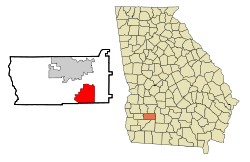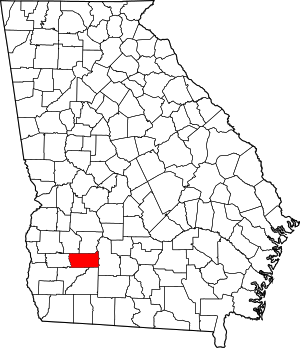Putney, Georgia
Putney is a census-designated place (CDP) and unincorporated community in Dougherty County, Georgia, United States. The population was 2,898 at the 2010 census.[3] It is part of the Albany, Georgia Metropolitan Statistical Area.
Putney, Georgia | |
|---|---|
Census–designated place and Unincorporated Community | |
 Location in Dougherty County and the state of Georgia | |
 Putney, Georgia Location within the United States | |
| Coordinates: 31°28′23″N 84°7′17″W | |
| Country | United States |
| State | Georgia |
| County | Dougherty |
| Area | |
| • Total | 21.9 sq mi (56.8 km2) |
| • Land | 21.9 sq mi (56.6 km2) |
| • Water | 0.1 sq mi (0.3 km2) |
| Elevation | 200 ft (61 m) |
| Population (2010) | |
| • Total | 2,898 |
| • Density | 133/sq mi (51.2/km2) |
| Time zone | UTC-5 (Eastern (EST)) |
| • Summer (DST) | UTC-4 (EDT) |
| ZIP code | 31782 |
| Area code(s) | 229 |
| FIPS code | 13-63084[1] |
| GNIS feature ID | 0332767[2] |
History
A post office called Putney was established in 1897.[4] The community was named after Francis F. Putney, a local landowner.[5]
Geography
Putney is located in southeastern Dougherty County at 31°28′23″N 84°7′17″W (31.473076, -84.121492).[6] The southern border of the CDP is the Mitchell County line, and part of the western edge is the Flint River. U.S. Route 19 (the Liberty Expressway) is the main highway through Putney, leading north 7 miles (11 km) to Albany and south 50 miles (80 km) to Thomasville.
According to the United States Census Bureau, the Putney CDP has a total area of 21.9 square miles (56.8 km2), of which 21.9 square miles (56.6 km2) is land and 0.1 square miles (0.3 km2), or 0.49%, is water.[3]
Demographics
As of the census[1] of 2000, there were 2,998 people, 1,138 households, and 899 families residing in the CDP. The population density was 139.6 people per square mile (53.9/km2). There were 1,223 housing units at an average density of 56.9/sq mi (22.0/km2). The racial makeup of the CDP was 68.81% White, 29.52% African American, 0.13% Native American, 0.23% Asian, 0.50% from other races, and 0.80% from two or more races. Hispanic or Latino of any race were 1.00% of the population.
There were 1,138 households, out of which 31.8% had children under the age of 18 living with them, 59.7% were married couples living together, 14.8% had a female householder with no husband present, and 21.0% were non-families. 17.2% of all households were made up of individuals, and 5.4% had someone living alone who was 65 years of age or older. The average household size was 2.63 and the average family size was 2.96.
In the CDP, the population was spread out, with 24.4% under the age of 18, 8.3% from 18 to 24, 26.5% from 25 to 44, 28.5% from 45 to 64, and 12.3% who were 65 years of age or older. The median age was 39 years. For every 100 females, there were 96.8 males. For every 100 females age 18 and over, there were 93.8 males.
The median income for a household in the CDP was $40,953, and the median income for a family was $44,244. Males had a median income of $35,377 versus $21,910 for females. The per capita income for the CDP was $18,828. About 12.8% of families and 16.8% of the population were below the poverty line, including 26.9% of those under age 18 and 11.9% of those age 65 or over.
Neighborhoods
- Hollands Folly
- Loretta Heights
References
- "U.S. Census website". United States Census Bureau. Retrieved 2008-01-31.
- "US Board on Geographic Names". United States Geological Survey. 2007-10-25. Retrieved 2008-01-31.
- "Geographic Identifiers: 2010 Demographic Profile Data (G001): Putney CDP, Georgia". U.S. Census Bureau, American Factfinder. Retrieved October 23, 2015.
- "Post Offices". Jim Forte Postal History. Retrieved 25 May 2019.
- Krakow, Kenneth K. (1975). Georgia Place-Names: Their History and Origins (PDF). Macon, GA: Winship Press. p. 182. ISBN 0-915430-00-2.
- "US Gazetteer files: 2010, 2000, and 1990". United States Census Bureau. 2011-02-12. Retrieved 2011-04-23.
